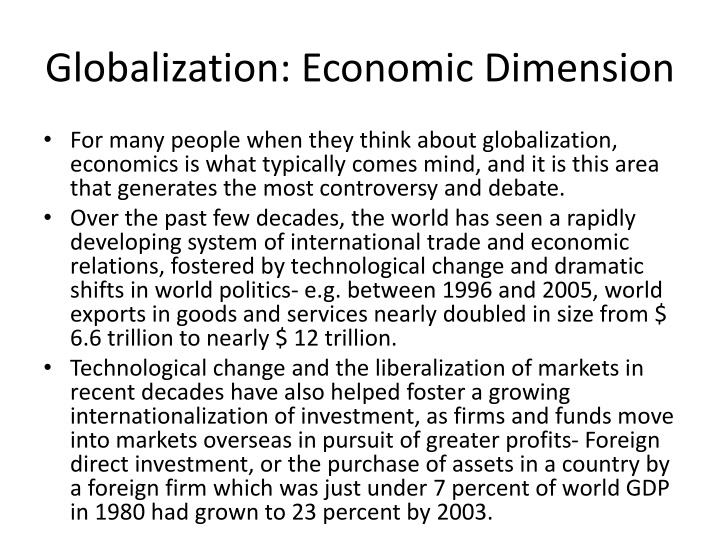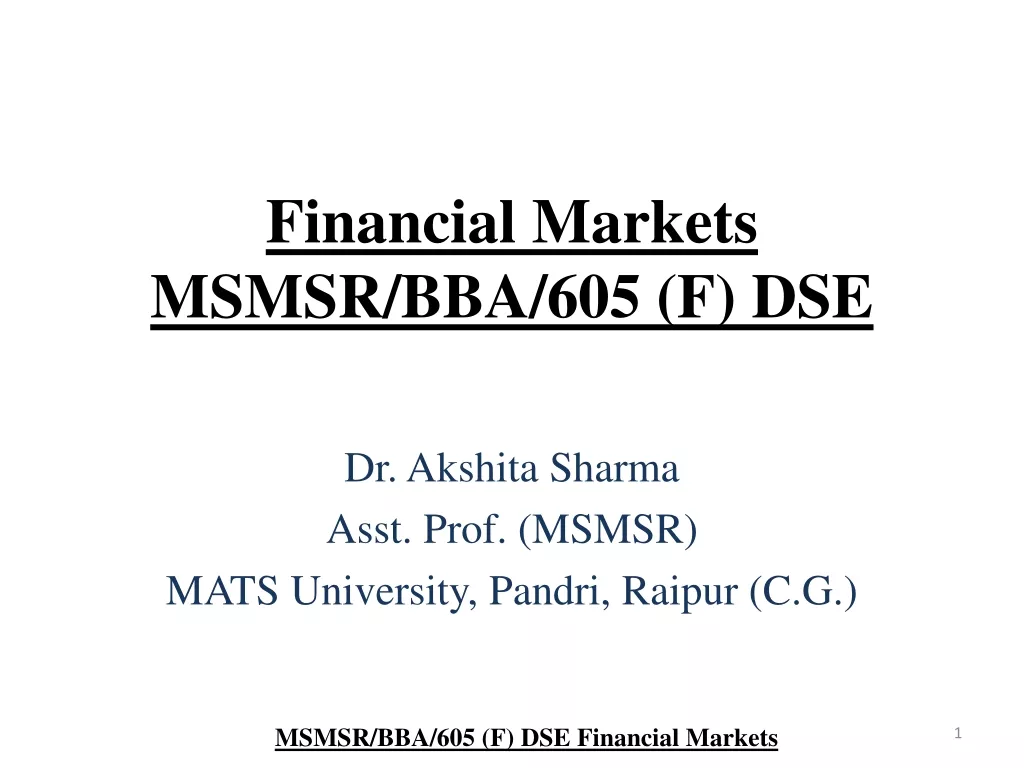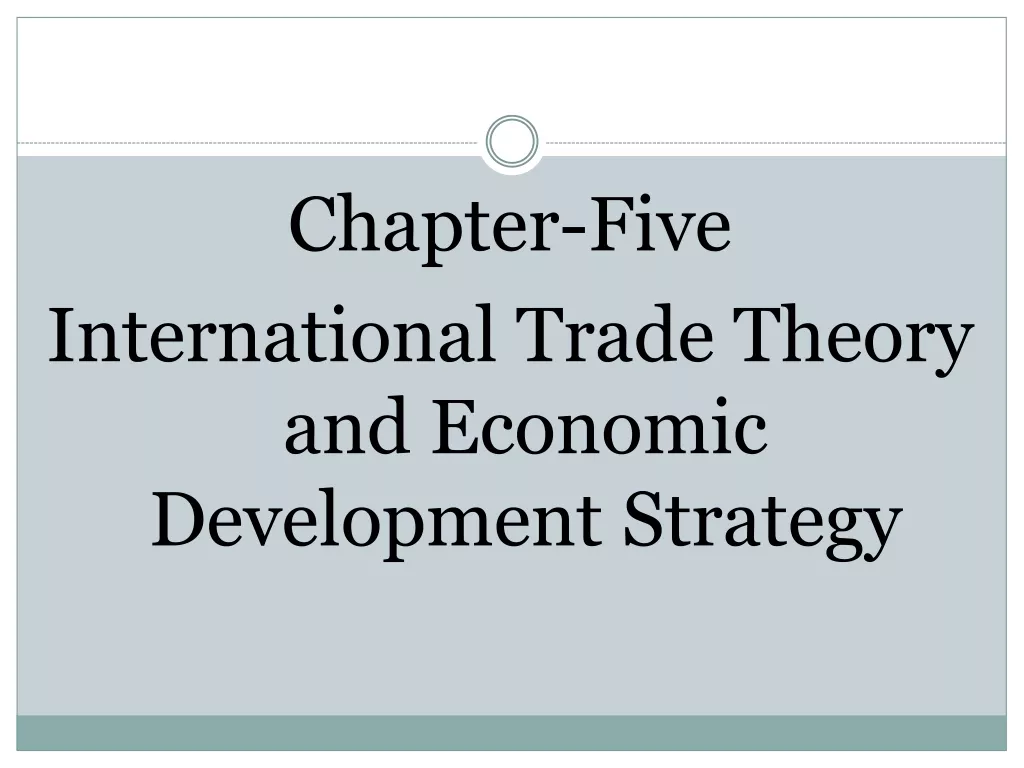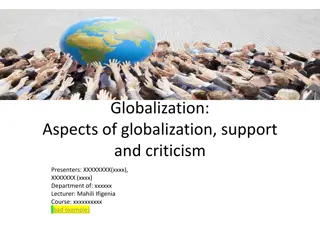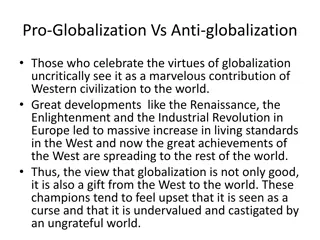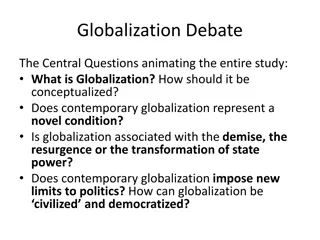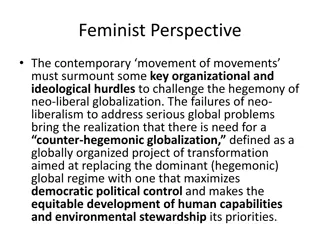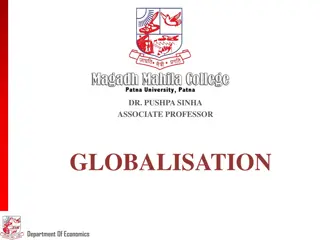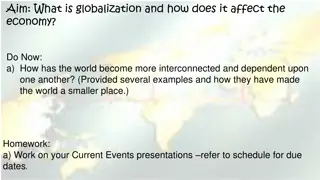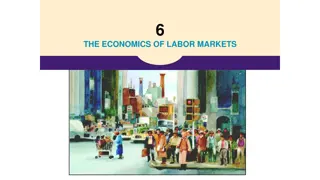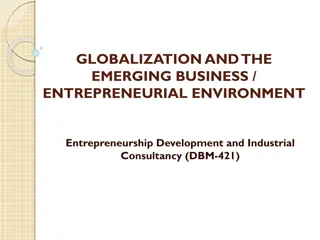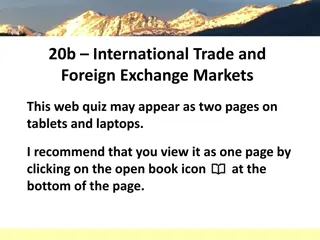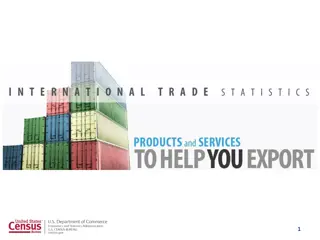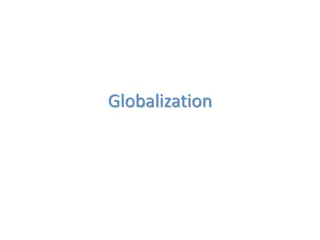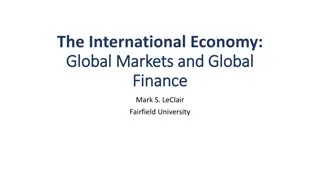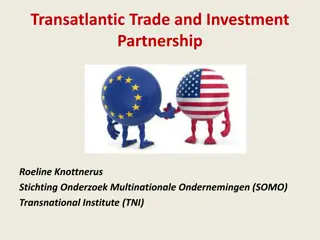The Economic Dimensions of Globalization: Impact on Trade, Investment, and Labor Markets
Globalization in the economic realm has led to a surge in international trade, foreign direct investment, and the dominance of multinational corporations. Enabled by advancements in technology, globalized markets have facilitated the movement of goods, services, and capital across borders, leading to increased competition and opportunities for innovation and specialization. This interconnected global economy has allowed for the efficient allocation of resources, creating jobs, spreading wealth, and raising living standards worldwide.
Uploaded on Jul 25, 2024 | 3 Views
Download Presentation

Please find below an Image/Link to download the presentation.
The content on the website is provided AS IS for your information and personal use only. It may not be sold, licensed, or shared on other websites without obtaining consent from the author.If you encounter any issues during the download, it is possible that the publisher has removed the file from their server.
You are allowed to download the files provided on this website for personal or commercial use, subject to the condition that they are used lawfully. All files are the property of their respective owners.
The content on the website is provided AS IS for your information and personal use only. It may not be sold, licensed, or shared on other websites without obtaining consent from the author.
E N D
Presentation Transcript
Globalization: Economic Dimension For many people when they think about globalization, economics is what typically comes mind, and it is this area that generates the most controversy and debate. Over the past few decades, the world has seen a rapidly developing system of international trade and economic relations, fostered by technological change and dramatic shifts in world politics- e.g. between 1996 and 2005, world exports in goods and services nearly doubled in size from $ 6.6 trillion to nearly $ 12 trillion. Technological change and the liberalization of markets in recent decades have also helped foster a growing internationalization of investment, as firms and funds move into markets overseas in pursuit of greater profits- Foreign direct investment, or the purchase of assets in a country by a foreign firm which was just under 7 percent of world GDP in 1980 had grown to 23 percent by 2003.
MNCs Dominating Global Markets Assisted by more open markets and reduced costs for transportation, large firms such as IBM, Honda, McDonald s, and Johnson and Johnson control assets and make profits in the billions of dollars. These economic developments are compounded by expanding global communications. Recent recessions notwithstanding, the development of electronic commerce, with its ability to link far-flung businesses globally, is transforming the way in which markets, firms, and individuals interact. Technological innovations have reduced many of the traditional barriers to trade. Firms and people are able to buy goods and services from around the world using fewer or no intermediaries. Thus, markets are more open and firms face greater competition. A business in China or Chile, for example, can market its goods and services directly to other firms or individuals anywhere in the world.
The Area of Investment In the area of investment, too, online banking and investment allow people to move their money internationally with a few mouse clicks. Finally, economic globalization also applies not just to trade, firms, or finances, but also to labour. Globalization may shift not only where things are made, but also where labour is located. Optimists see in these dramatic changes the mechanism for future global prosperity. Through the expansion of international economic connections, goods and services, labour , and other resources can be allocated more effectively through a broader market, unfettered by tariff barriers and other obstacles that states erect.
Encouragement to Innovation, Specialization, & Lowering of Cost Countries are able to export what they produce best, encouraging innovation, specialization, and lower costs. Jobs are also created as capital flows and trans national corporations take advantage of new markets and new opportunities. People, too, can move to where there is work, whether domestically or internationally. In the end , wealth is diffused more effectively through open markets for goods, labour, and capital, increasing standards of living worldwide. Globalization is thus viewed as a positive trend, the means to lift billions out of poverty and generate greater prosperity by allowing more people to be a part of the global marketplace for goods and labour.
Downsides of Economic Globalization Others view economic globalization with more suspicion, particularly those who are less enamored of a liberal political economy. Some equate increased trade with increased dependence, arguing that trade creates conditions whereby some countries will gain monopoly control over particular goods vital in the international economy such as software, energy, biotechnology, or pharmaceutical products- this results in unequal relationships in the international system. The globalization of investment and labour markets is also criticized as a system in which firms invest in countries with cheap labour and weak labour regulations in order to increase profits. These moves eliminate manufacturing jobs in the advanced democracies.
Downsides of Economic Globalization (contd.) This offshoring of jobs hurts workers around the globe as countries engage in a race to the bottom, lowering standards and weakening regulations in order to keep or attract business. As economic globalization weakens state capacity and autonomy, it is replaced not with global rule of law, but rather with a small cartel of powerful corporations that lack any national or democratic control. Freedom and equality are thus compromised. There has been much discussion that offshoring has led to the movement of industries overseas, especially those in the service sector, where technology can overcome problems of time and space-call centres, data processing, and software programming are commonly cited examples, but others include medical diagnosis (such as reading X-rays or CAT scans) and film animation.
Important Questions Regarding Offshoring First, there is the question of whether the cost savings from offshoring could translate into increased economic growth and new job opportunities to replace those lost. A second issue is the potential increase in employment in the less-developed and newly industrializing countries, which could in turn reduce poverty there. A third consideration is whether outsourcing will make it difficult for low-skilled workers to find new forms of employment, or ones that pay well. There is already evidence that offshoring has led to the decline in wages for low-skilled labour in the US.
The Benefits or Dangers of Economic Globalization: Unclear and Debatable With increasing globalization the percentage of the world s population that lives in poverty has declined and people s life expectancy has risen, particularly in parts of the that are more globalized (China, India) compared with those that are not (Africa). There is also evidence of a growing gap between rich and poor-if not between countries, then within them, as in China, India, and the US.
The Benefits or Dangers----(contd.) Amidst this uncertainty and debate there is a consensus on how globalization is changing economic institutions around the world. One assertion about which there is agreement is that, as a result of the deepening interconnections between economies around the world, there is a greater chance that local crises and problems may become global ones. The growing linkages of finance, trade, and markets now increase the likelihood that local events will ripple throughout the system- e.g. the Asian Financial Crisis of 1997; in which growing concerns about future economic growth led to a sudden withdrawal of capital from the region, wiping out stock markets, throwing economies into recession, and increasing unemployment. Terrorist attacks may have a similar effect, affecting markets worldwide. Greater economic linkages may create new opportunities for growth, but with these opportunities may come greater uncertainty, instability, and risk.
